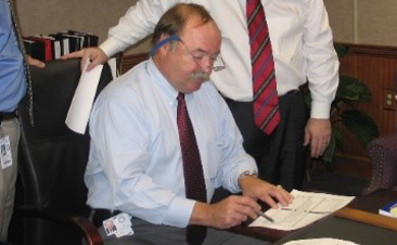|
|
| A Few Moments with John Rees |
| By Joe Bouchard |
| Published: 10/26/2015 |

Perhaps it is an understatement to merely say that John Rees is a corrections professional with experience. It is like saying that Lake Superior is a little chilly in December or that Bill Gates is sort of well-off. With four decades in corrections and many different positions under his belt, Rees is truly someone who has seen changes. In addition, Mr. Rees attended the University of Kentucky and Florida State University. In his book, "My Life", he looks at how he, prison operations, and society have developed. We spoke recently. Bouchard: Your corrections career began in the tumultuous 1960’s. Do you think that prisoners have changed fundamentally since then? If so, in what way(s)? Rees: It was a wild and crazy time. I believe that prisoners have not changed fundamentally. Yet, they are nowhere nearly as dangerous as a group now as they were then. There was a higher percentage of violence then. Now we deal with categories such as drug dealers and check writers. Today it seems that we lock up people we are mad at rather than those we are afraid of. For example, in Kentucky there are over 500 prisoners locked up as felons for non-support. Certainly, they are not good citizens. But don’t take away their work and lock them up so they cannot pay their debt. It makes no sense. It is crucial that the next generation of leadership address this issue. Bouchard: How about staff? Are those who hired into corrections now different from those who came during the Johnson Administration? Rees: Staff have changed quite substantially in the last forty years. They are now very educated and career oriented. When I started, there was little or no educated staff. Staff are now more professional. Accreditation standards and court orders have aided in this. Bouchard: Do you believe that it would be easier or more difficult to start in the corrections profession today as compared to 1968? Rees: It would be easier to start a career in corrections today than forty years ago. When I started in graduate school, there were only five schools in corrections, including John Jay and Michigan State University. Today, there are many educational and job opportunities in every state in the Union. Also, the availability of mentoring is much greater today. Bouchard: Please share your defining moment in your career. Rees: I was fired by Kentucky’s Governor in 1977. So, I went to Oklahoma and was offered three jobs. I took my pick and flourished. I was Deputy Director in 4 years. Through this, I gained a higher level of confidence. I felt that I could do anything, and I do not mean that in an egotistical manner. Confidence is key in high level positions. Bouchard: Which of your mentors was most influential on your career and the way you operated as a corrections professional? Rees: Vernon Fox was very influential on me. He was a former Deputy Warden in Michigan’s famous Jackson Prison, once the largest prison in the world. Fox left corrections for academia. For Florida State, Fox founded the Criminal Justice and Corrections school. His advice was, “Don’t be afraid to try things. Push the envelope. You will step on toes. Do not be afraid to get fired if you are doing the right thing.” Bouchard: Can you describe your brightest and most promising corrections protégé? Rees: There are too many to name. I hired a great many of people and many were successful. At ACA these days many will come up to me and thank me. I am glad that so many continue to do a good job in our field. Bouchard: In 100 words or less, what advice do you offer to new corrections staff in search of vocational success? Rees: Learn all you can learn. Be diligent. Don’t be afraid to try something new within rules. Look outside the box. Care about staff and inmates and families. You are providing public safety - take it seriously. Bouchard: What would you change about your career in corrections if you had a chance? Rees: I am not sure that I would change anything. Silly things occurred, but I learned from them. Failure allowed me to learn and become a better professional. Bouchard: What do you see as the future of American corrections? Rees: I don’t know exactly what the future holds for corrections. I am afraid that we may forget our history and we move back to where we were before. Remember the 70’s and ‘80’s when prisons were very violent. Standards, classification and controlled units helped curb violence. However, the pendulum may swing and we may stop locking up the truly dangerous. There may be episodes of increased hostage taking. I CERTAINLY hope not. Do not forget our history, we are not perfect. Bouchard: What is your legacy? Rees: Accreditation, fair, firm consistent management, concerned about inmates, staff, families and the public. Take into consideration all four of these factors. Joe Bouchard is a Librarian employed with the Michigan Department of Corrections and a collaborator with The International Association of Correctional Training Personnel (IACTP). He is also the author of “IACTP’s Corrections Icebreakers: The Bouchard 101, 2014”. The installments in this series include his opinions. The agency for which he works is not in any way responsible for the content or accuracy of this material, and the views are those of the contributor and not necessarily those of the agency. While some material is influenced by other works, all of the icebreakers have been developed by Joe Bouchard. Visit the Joe Bouchard page Other articles by Bouchard: |
MARKETPLACE search vendors | advanced search

IN CASE YOU MISSED IT
|


Comments:
No comments have been posted for this article.
Login to let us know what you think